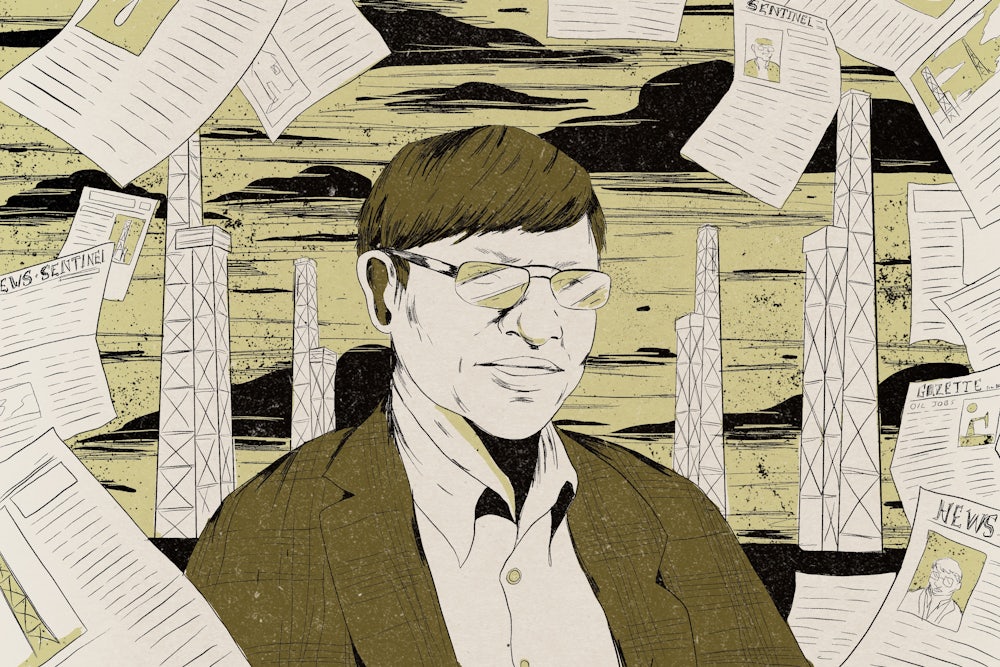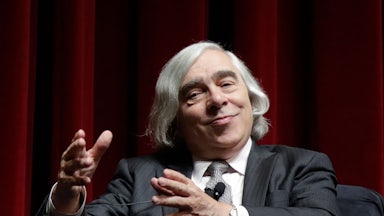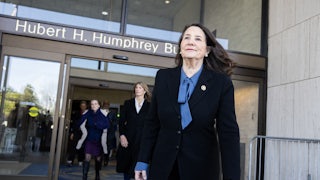“If we hit our CO2 targets and every one of us are living in abject poverty, is that really how you really want to live?” Greg Kozera is making his pro-fracking case to me. Later in our phone call, he’ll argue that renewable energy depends on child labor in Congolese cobalt mines and observe that his golden retriever lived to the ripe age of 14 years old romping around three fracking wells, proving that the practice poses no health risks. He makes a version of this case every weekend in the opinion pages of newspapers throughout Ohio, West Virginia, and Pennsylvania—the case for natural gas, for industry, and, if you take his word for it, for America.
Four years ago, an editor at the Parkersburg News and Sentinel in West Virginia contacted Shale Crescent USA, a nonprofit “messaging” organization in Marietta, Ohio, whose funders include natural gas companies and pipeline construction companies, to ask what the group’s work entailed. Kozera, a former oil and gas salesman who now serves as Shale Crescent’s head of marketing, responded by suggesting the paper run a five-part series, authored by himself, about how to return jobs to the Mid-Ohio Valley by embracing natural gas. The series debuted in August 2017 and was such a hit, to hear Kozera tell it, that the paper offered him a weekly column. Then the column started getting picked up by other regional papers, including the Charleston Gazette-Mail and occasionally the Columbus Dispatch. Today, Kozera’s weekly pro-fracking column often runs in eight to 10 local papers throughout the Ohio River Valley, reaching anywhere from 60,000 readers to well over 200,000 if his column is picked up by the region’s major papers like the Gazette-Mail, Dispatch, or Akron Beacon Journal. It reaches even more when recirculated by national publications like the New York Daily News, which has one of the largest readerships in the country.
Four years after the News and Sentinel’s initial inquiry, Kozera is now one of the most ubiquitous voices in the fracking conversation in the Marcellus Shale region, which stretches from southern New York down through the three crucial battleground states of West Virginia, Ohio, and Pennsylvania. And for nearly as long as he’s been writing those columns, environmentalists and climate scientists have asked the newspapers publishing his words a simple question: Why have they given this man a megaphone?
West Virginia newspapers, like most local news outlets, have had a rough few decades. Once a bastion of accountability journalism and cross-town rivalries, the region’s dailies were decimated by mergers and layoffs of the late 1990s and early 2000s, just as the natural gas industry was about to explode, replacing the declining coal economy. Since the shale boom of 2008, West Virginia has set state records every year in terms of natural gas production. The focus, and even ownership groups, of the adjacent regional newspapers has shifted accordingly. In 2018, the Charleston Gazette-Mail, already the result of a merger of two competitors, was bought by HD Media; its founder, Doug Reynolds, the son of a tobacco tycoon who now owns upward of eight newspapers in West Virginia, is the president and CEO of a natural gas pipeline company.
As local outlets struggle to inform the community while maintaining their readership, the extractive industry promises readers a seductive short-term fix to a generations-spanning crisis. These readers, in turn, hold outsize sway in the national conversation: Both Pennsylvania and Ohio remain swing states, while West Virginia Senator Joe Manchin now operates as the deciding vote in the tightly split chamber. The fight for the hearts and minds of these voters is happening locally. Messengers like Kozera have both a captive and disproportionately powerful audience.
Kozera columns follow a formula. He offers short bursts of useful, blandly agreeable Chicken Soup-esque advice as packaging peanuts while delivering the gospel of fossil fuels. Last March, for example, Kozera opened a column with a seemingly level-headed lede about how he hoped that the Trump administration would speak honestly about the threat of the pandemic. The column then unspooled into a hodgepodge commentary on “truth,” connecting Kozera’s experience being stood up in college to the unfolding economic ruin. After a brief detour into Trump-Russia trutherism, the point of the piece emerged: “As an engineer, I have caught the major media in numerous lies and half truths about energy, renewables and hydraulic fracturing.” (He generally refers to all fossil fuel critics as “antis.”)
In a January column purportedly about the importance of focus, Kozera quoted motivational speaker Willie Jolley saying, “Success isn’t about hocus pocus it is about focus focus”; spent a couple paragraphs on Covid-19; criticized Trump’s second impeachment; praised the high school soccer team he coaches (state runners-up this year!); and then took an abrupt turn into an oil and gas sales pitch: “At Shale Crescent USA our focus is on creating jobs. It was sad to see the Keystone XL pipeline project shut down this week with the loss of over 10,000 jobs out west.”
Shale Crescent’s goal, according to its website, is to “deliver targeted messaging to high energy intensive industry decision makers.” When Kozera called me last week to chat about his columns, it was clear why Shale Crescent tapped him to deliver that message. His script was flexible; his manner laid-back and affable. He just wants people to have good-paying jobs, he said. Fostering ties between the fracking industry and local communities is a lot like his role coaching the high school soccer team. He wants his community and his country to be self-sufficient. He’s an “environmentalist at heart,” and his job is “not about oil and gas,” but part of a moral-driven effort to help raise the standard of living.
He also happens to be dead-set on convincing anyone willing to listen that natural gas is America’s best and only path forward.
“I believe we have an ethical responsibility to [speak up],” Kozera told me, “if someone’s proposing something that I know is going to kill a bunch of people.” And renewable energy, Kozera said, will kill people. “Make solar panels in Cambridge, Ohio—that’s great. Those are real good jobs, we’ll do that,” Kozera said. But, “when the sun doesn’t shine, the wind doesn’t blow, and people start dying in the dark, I got a problem. I got a serious problem with that. And the best way I can think to solve that is to educate the public so they understand what’s at stake.”
There isn’t actually evidence that transitioning to solar and wind energy will kill people; coal and oil already kill millions every year through emissions alone (more, when you factor in spills and other accidents), while estimates suggest wind or solar might kill one person every 29 or 53 years, respectively. But Kozera’s tone relayed nothing but an air of reasonableness—he wasn’t so much trying to convince me that wind and solar are the harbingers of death as he was trying to get me to agree that people dying in the dark is bad.
This superficial air of compromise and common sense pervades his work. He does not deny climate change. “You can’t keep putting garbage in the atmosphere without bad stuff happening,” he said. But he’s adamant that the American government, its industries, and its citizens should support the continued increase of fracking and natural gas production. America, he told me, should ramp up fracking and export the gas back to China, to aid in the shuttering of its coal plants and build a sustainable revenue stream and economic bedrock for American towns. (Fracking’s massive release of methane—a greenhouse gas 84 times more potent than carbon dioxide in the short term—doesn’t seem to factor into Kozera’s vision.)
The picture he paints for the readers of the News and Sentinel, the Times, the Jeffersonian, and the rest is simple: Fracking will give them jobs. It won’t poison them. “The antis are still looking for one well where fracturing has contaminated ground water,” he wrote in October.
The editors and publishers who ran Kozera’s column did not issue a correction or addendum to his piece, even though both ProPublica and the Environmental Protection Agency have documented numerous cases of suspected fracking contamination of local groundwater. In 2019, a report found oversight of the fracking industry’s wastewater disposal procedures and permits has been patchy and inconsistent in West Virginia, potentially endangering drinking water. In recent years, research has linked fracking to higher incidences of numerous health problems, with particularly robust evidence for asthma and pregnancy and birth outcomes. The News and Sentinel did not respond to The New Republic’s request for comment for this piece. On the phone, Kozera offered a verbal shrug, saying of fracking: “If it was really as bad as everybody said it was, we should all be dead by now.”
The thing about talking to Kozera is that, even when you disagree with him at every juncture, it’s a cordial conversation. That’s its power: Research tells us this blend of the casually personal and political is the best way to persuade people, whether that means convincing them that climate change is real or that fossil fuels should rule the world. It’s called “deep canvassing.” Instead of having to go door to door or visit every local meeting to convince people to invite the fracking industry into their towns, Kozera can currently reach a regular readership of 60,000 that expands into the hundreds of thousands depending on which other dailies choose to syndicate that week.
The people who could fact-check his claims don’t have that platform, even though they’re trying hard to break through. Last week, Eric Engle, who heads a variety of conservation efforts, including the nonprofit organization Mid-Ohio Valley Climate Action, wrote to the News and Sentinel protesting the outsize role Kozera has been given in the paper’s opinion pages. Shortly before the November election, Randi Pokladnik, an Ohio resident with a Ph.D. in environmental studies, penned an op-ed in the News and Sentinel refuting one of Kozera’s pieces about the merits of fracking. And after Kozera tried to blame the February winter storm catastrophe in Texas on renewable energy, community member Jean Ambrose wrote a letter to the editor objecting both to the inaccuracies and the broader thrust of Kozera’s columns. “The buildout of the region based on natural gas hasn’t delivered as promised,” she wrote. “You know it, and I know it. But Kozera hopes you don’t remember that, and keeps pushing fake facts so we’ll let fossil fuels squeeze the last bit of profit out of our communities before they take their private jets and move to Cancun.”
Ambrose is right. That’s the really troubling part of this story: It’s not just that fracking pollutes and Kozera says it doesn’t. The core appeal of Kozera’s original column—the promise of jobs and prosperity that helps people look away from the pollution, and the reason his original series probably did well at the News and Sentinel—has now been debunked by a number of economic studies. In February 2019, research produced by the West Virginia Center on Budget and Policy and the Institute for Energy Economics and Financial Analysis found that many of the industry’s early projections overstated the actual impact of natural gas production on West Virginia’s economy. From 2008 to 2017, the natural gas industry added 2,500 jobs, not the 5,700 that were predicted, the study’s authors wrote: “The only reason that there has been any growth in employment at all from 2008 to 2017 is the increase in employment due to natural gas pipeline construction, which are largely temporary jobs,” almost half of which go to out-of-state workers.
This pattern holds for nearly every major natural gas project proposed in the past 12 years: When a pipeline is completed, the need for construction jobs disappears, and the day-to-day operations of these fracking outposts or pipelines are continued by a relatively small number of employees.
Neither Engle, Ambrose, or Pokladnik—all of whom are good writers, by the way—gets a spot in the paper on a weekly basis. Their voices and their columns are, by nature of being in response to Kozera, reactionary, and as such, easily sidelined. Relegated to the task of debunking sweeping claims, their articles necessarily read as more pedantic than Kozera’s mishmash of half-truths.
Kozera isn’t alone. At a national level, columnists like Ed Rogers at The Washington Post have likewise used their service in the gas and oil industry as bona fides to secure the precious inches in otherwise respectable journalistic organizations. But Kozera’s readers are particularly influential. They’re in battleground states, and they’re older. The audience that pays for local news overwhelmingly skews toward those aged 50 and up; the same group dominates its younger counterparts in voter turnout, even in last November’s presidential election.
Kozera’s aims aren’t outwardly motivated by electoral politics. On the phone, he never touched on any elections or public officials, save for an obligatory passing reference to House Representative and Green New Deal advocate Alexandria Ocasio-Cortez. His appeal isn’t in being the local version of Tucker Carlson or Sean Hannity, stirring people into an outrage through hateful messaging. It’s in being the steady, friendly voice of reason so many people yearn for in their local paper. When Kozera asked me how “we” would feel hitting emissions targets but living in abject poverty, he followed it up with a personal appeal. “You’ve got a lot more living to do than I do,” Kozera said. “Your kids should have every opportunity that I’ve had—that my kids have had—and they should have the opportunity for a future brighter than anything we’ve ever had. And that’s possible.”
The truth is, there is no one person or paper to blame or thank for Kozera growing into a mainstay regional columnist, except maybe Kozera himself. The paper needs readers, and many of its readers need jobs. Greg Kozera promises both. That he can simultaneously make that promise, maintain his grandfatherly tone, and launder an agenda as blatant as any you’ll hear or read is his gift—and maybe the Ohio River Valley’s curse.








